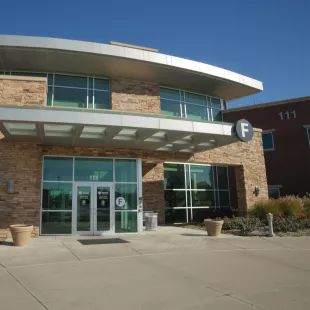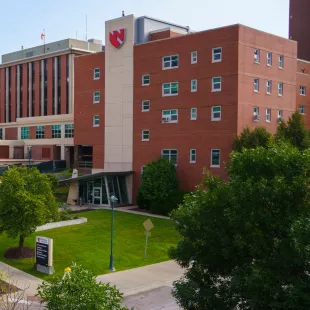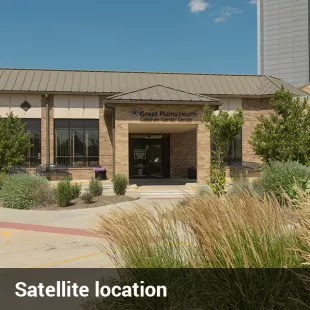The adrenal glands (also called suprarenal glands) sit on top of each of your two kidneys and release chemicals called hormones. These hormones control various body functions, helping to regulate your metabolism, immune system, blood pressure, response to stress and other essential functions.
Nebraska Medicine Treats a Variety of Adrenal Gland Issues
Adrenal glands can develop tumors, most of which are not cancerous. Adrenal tumors can make excess amounts of the normal hormone made in the adrenal glands like adrenaline, cortisol, aldosterone, and testosterone. A tumor that makes too much of the stress hormone cortisol for example, can cause what’s called Cushing’s Syndrome. In some people, this can lead to excess weight gain, easy bruising, high blood pressure, bone loss, and excess male patterned hair growth. A tumor that makes too much adrenaline hormone is called a pheochromocytoma, which can lead to high blood pressure, sweating, and hot flashes.
Another adrenal gland problem can be a situation where they don’t make enough normal hormones. If the adrenal glands do not make enough cortisol, it’s referred to as adrenal insufficiency. If the cause of adrenal insufficiency is due to an autoimmune disease, it’s referred to as Addison’s disease. Signs and symptoms of adrenal insufficiency include abdominal or digestive issues, nausea, unintended weight loss, low blood pressure or blood pressure that drops when you stand up, and feeling lightheaded.
There are also genetic disorders, such as congenital adrenal hyperplasia, that occur when there are problems with normal production of adrenal hormones.
Adrenal Gland Care
At Nebraska Medicine, we see all types of adrenal gland problems. We practice a multidisciplinary approach to adrenal gland care and have expert endocrinologists at multiple locations. Our team provides a range of specialized approaches to diagnose and determine the extent of disease, which (depending on the issue) may include:
- Radiographic scans
- Adreno-venous sampling
- Biochemical testing
- Genetic testing
If there is suspicion for adrenal gland over or underproduction of any of the normal hormones, our endocrinologists can evaluate with blood and urine tests, and imaging if needed. If the adrenal glands are not making enough of a necessary hormone, then treatment with that hormone as a medicine is needed.
Surgery for the Adrenal Glands
Not all adrenal conditions need to be treated surgically, but if there is an adrenal gland tumor and the adrenal glands are making too much of a specific hormone, then surgical removal may be necessary. Tumors in the adrenal gland may need to be removed if they are large, growing in size, or producing excess hormones. Surgery is typically performed with a minimally invasive approach using four small incisions (less than half an inch) on the abdomen. Laparoscopic adrenalectomy procedures are performed more than 30 times per year at Nebraska Medicine by surgeons specifically trained in adrenal surgeries. If any surgeon performs more than six per year, that person is considered an expert, according to studies like this one. Following surgery, most people return home the following day.
Cancer of the adrenal gland is very rare. The five-year survival rate is 65 percent for people with a cancerous tumor in the adrenal gland, as long as it has not spread.
Why Choose Nebraska Medicine for Adrenal Gland Diagnosis and Treatment?
A Wide Variety of Diagnostic Tools and Expertise
Cancer in adrenal glands can be very challenging to diagnose. The indicators are very similar to a non-cancerous adrenal tumor. To be sure we are providing an accurate diagnosis, we partner with expert pathologists as a part of our team. In order to diagnose precisely what’s wrong with your adrenal gland, an evaluation could include:
- A blood and urine test
- Imaging with CT (computed tomography) scan
- MRI (magnetic resonance imaging) scan
- Occasionally a PET (positron emission tomography) scan
- Pictures of your blood (an adrenal venogram)
Deep Experience and Collaboration With all Endocrine and Cancer Care Diseases
Identifying the exact issue can be difficult to pin down and treatments vary significantly. For this reason, it’s critical to have your case worked on by a collaborative team of endocrine and cancer experts. You receive that kind of expert care here at Nebraska Medicine. We have multiple board-certified endocrinologists, surgeons, and cancer doctors (oncologists) who meet regularly in order to coordinate care for each patient.
Locations Throughout the Omaha Area
We want to make treatment as stress-free as possible. If you’re coming in from out of town, we strive to package your appointments with different team members on the same day - or set of days - to minimize travel and hotel time. Our endocrinologists and oncologists see patients at multiple locations.
We Maintain an Adrenal Tumor Registry
It is a combination of tumor specimens and information on adrenal tumors we can use to help make care decisions for other patients with adrenal diseases.
Our Locations
-

-

Diabetes and Endocrinology Center at Bellevue Health Center
2510 Bellevue Medical Center Drive, Suite 150
Get Directions
Bellevue, NE 68123 -

Diabetes and Endocrinology Center at Specialty Services Pavilion
4350 Emile St.
Get Directions
Omaha, NE 68105 -

-




